Trading Day: live markets coverage, plus analysis and opinion
AGL could lose $32m a year in earnings if the Liddell power station stays open until 2027, UBS says.
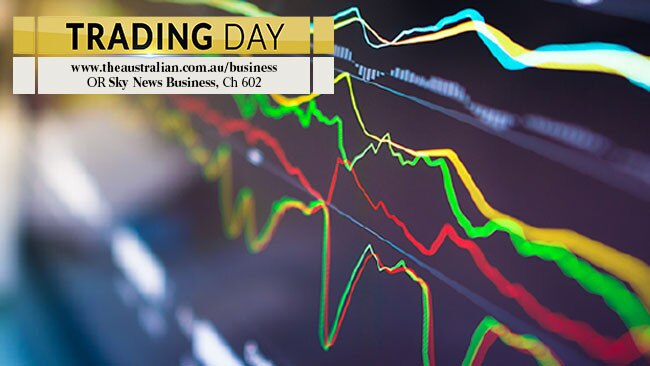
Welcome to Trading Day for Wednesday, September 13.
4.30pm: Stocks close steady
The share market surrendered its early gains to close relatively steady amid caution ahead of US inflation data and Australian jobs figures out later in the week.
At 4.15pm (AEST), the benchmark S & P/ASX200 was down 2.1 points, or 0.04 per cent, at 5,744.3 points, while the broader All Ordinaries index was down 2.4 points, or 0.04 per cent, at 5,804 points.
The September SPI200 futures contract was down four points, or 0.07 per cent, at 5,741 points.
AAP
4.20pm: Investors like it sweeter
Investors have welcomed the sweetened 360 Capital bid for Asia Pacific Data Centres, sending the target’s shares up 4.5 per cent to $1.96 in afternoon trade.
The buying suggests investors see the fresh, unconditional $1.95 offer as likely to go ahead.
3.50pm: Aveo confident it can defend class actions
Aged care company Aveo Group has denied taking advantage of its elderly residents after a law firm said it may launch a second class action against the company for allegedly using “unfair and unconscionable” contracts. Lawyers Maurice Blackburn on Wednesday said it will look into running a no-win no-fee class action for former residents, calling for stronger rights and protections for older residents and their families.
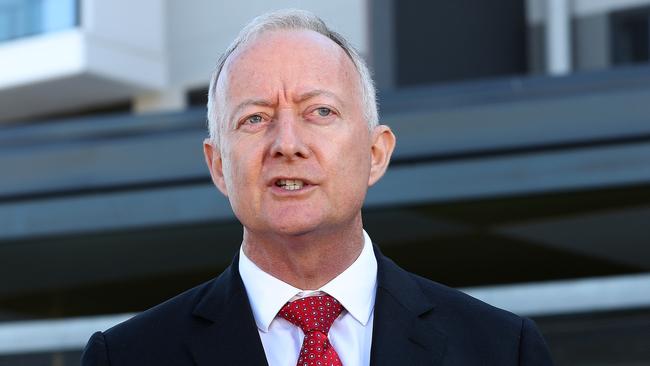
The retirement communities owner has come under fire in recent months following a Victorian government inquiry into problems in the retirement housing sector and a consumer watchdog investigation.
Another law firm, Levitt Robinson Solicitors, announced in June it plans to launch a class action against Aveo.
Aveo said it is not aware of a class action from Maurice Blackburn, and has not been contacted.
Chief executive Geoff Grady denied the company has acted wrongly, saying it has and always will act with the best interests of its residents. “We vigorously deny any suggestion to the contrary and we are confident that we can show that we have at all times met our statutory and other obligations and our commitment to residents,” Mr Grady said in a statement.
Maurice Blackburn class action principal Brooke Dellavedova said a no-win, no- fee class action — which means clients will not be out of pocket if the case is unsuccessful — could be the best option for those affected.
“We don’t think it’s fair or legal to subject elderly people to complex and confusing contracts that contain unfair terms,” Ms Dellavedova said. “If enough people want to take action against Aveo, then we will look to step in and stand up for these people.” Consumer Action Law Centre chief executive Gerard Brody welcomed news of potential legal action, saying residents and their families have previously struggled to access justice due to court and tribunal expenses. “Until now, the retirement village sector has avoided proper scrutiny of its contracts, and it’s about time someone stood up for the rights of residents,” Mr Brody said.
Aveo shares were down 7.5 cents, or 2.95 per cent, at $2.465 at 1355 AEST.
AAP
3.10pm: Myer tipped to post weaker sales
Myer’s struggle to overcome sluggish consumer spending will be back under the spotlight tomorrow, with the department store giant expected to confirm a fall in sales amid its full-year results.
Fierce rival David Jones last month called out falling consumer confidence as a major factor behind a 0.7 per cent fall in full-year comparable sales, and Myer looks set to suffer too.
Chief executive Richard Umbers has been trying to turn around the business for two years but Myer (MYR) already warned in May that “challenging trading conditions” would continue to hurt sales.

The retailer reported a 3.3 per cent fall in its third quarter sales in May with comparable sales down 2 per cent.
Citi analyst Bryan Raymond wrote in a note that the second half was tough for David Jones and that Myer would likely have had a weaker performance.
“David Jones and Myer’s stores and customers overlap in many parts of Australia,” Mr Raymond said last month.
Citi has forecast Myer’s comparable store sales to drop 2.8 per cent and for earnings before tax and interest to have slipped in the second half of the 2017 financial year.
Mr Raymond said the second-half results will highlight the challenging conditions Myer has faced, particularly as Mr Umbers tries to cut back on discounting.
Myer announced in July that it will take a $45.6 million hit after writing off the value of its 20 per cent stake in Topshop’s Australian franchisee and impairing the value of its struggling sass & bide brand.
The retailer had previously expected net profit to exceed 2016’s $60.5m but the writedowns and another $20m of costs are expected to weigh. The company expects underlying net profit to be in the range of $66m to $70m.
Myer has shed many of its private labels and brought in more popular brands as concession stalls — outlets inside the department store — in the past year as part of its turnaround strategy.
The higher mix of concession stalls, with a focus on popular brands, including John Lewis and Veronica Maine, has reduced Myer’s operational costs. Myer shares have halved in value over the past year and were trading flat at 72 cents at 2.45pm (AEST).
AAP
Elizabeth Redman 3.00pm: 360 Capital sweetens takeover bid
360 Capital has just sweetened its takeover offer for Asia Pacific Data Centres, trumping a bid from data centre operator NextDC.
360 Capital is now offering an unconditional $1.95 cash per security, the same price as its previous bid but without the complexity of its earlier offer. The price is higher than a rival $1.87 bid from NextDC.
More to come
Richard Gluyas 2.45pm: ATM limit not the issue for CBA: APRA
The parameters of the prudential regulator’s inquiry into Commonwealth Bank have become clearer after APRA chair Wayne Byres’ appearance before the agency’s parliamentary oversight committee.
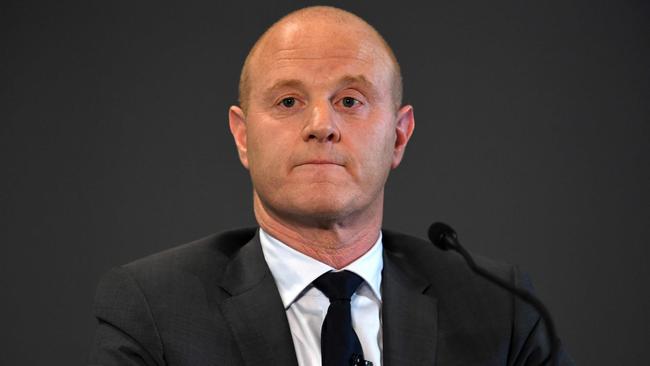
There’s been a lot of noise about CBA inviting trouble by setting a $20,000 limit for its network of intelligent deposit machines (IDMs) when the Austrac disclosure threshold for suspicious transactions is only $10,000.
The other three major banks set a limit of $5000 for their smart ATMs.
Byres told the House economics committee that the limit “in and of itself” is not the issue.
2.20pm: CBS bid for Ten labelled ‘discriminatory’
Ten’s administrators failed to tell the broadcaster’s creditors that a takeover by US media giant CBS did not treat all of them equally, and was therefore likely to be challenged, lawyers for rival bidder Bruce Gordon have told a court.
Dr Andrew Bell, SC, representing Mr Gordon, told the NSW Supreme Court on Wednesday that the CBS bid included “unexplained and inexplicable discriminatory treatment” carrying a high potential for litigation.
AAP
1.55pm: AGL could lose up to $32m a year
AGL could lose $32 million a year in earnings if it complies with the Government’s request to extend the life of the Liddell coal-fired power station to 2027, according to UBS.
The economics of extending the life of the 46-year-old power plant depends on the cost of refurbishing the plant, which AGL has previously said would be in the “hundreds of millions”, the cost of new coal supplies, and the wholesale price of electricity,
The $32m EBIT figure is based on a contracted coal price of $US70/tonne and an average wholesale electricity price of $60/MWh for 2022-2027 as modelled by the Finkel review and assumes a break-even electricity price of $64/MWh, according to UBS analyst Nik Burns.
AGL is currently working on a proposal for the government that outlines how it will replace the reduced electricity generation if the 1,680 MW Liddell plant closes as planned in March 2022.
The company’s original plan was to replace the lost supply with a mix of renewables and firming capacity.
UBS has a 12-month price target of $29.20 on AGL versus its current share price of $24.20.
Bridget Carter 1.25pm: PE circling I-Med
Global private equity giants Blackstone and Affinity have emerged as parties eager to buy one of the country’s largest private radiology providers, I-Med Radiology Network, which is up for sale through Morgan Stanley.
Both Blackstone and Affinity are said to be among the collection of buyout firms preparing to make a first round bid for the company by the beginning of next month in what is largely thought to be a shootout among sponsors.
Paul Garvey 12.43pm: A change in fortunes for Atlas Iron?
Forgotten iron ore miner Atlas Iron could be rolling in cash before too long if current iron ore prices persist, according to Perth firm Hartleys.
Hartleys analyst Trent Barnett this morning said that Atlas, which was nearly wiped out by the iron ore price collapse two years ago, is almost net cash positive and should be making around $15 per tonne at present on its unhedged production.
Even with its hedged position, Mr Barnett says Atlas should generate around $90 million in earnings before interest, taxation, depreciation and amortisation this financial year if iron ore prices hold steady. That compares to the company’s current market capitalisation of $176m.
While Hartleys has a valuation of 2.2c per share on Atlas, compared to its current price of 1.9c, that soars to almost 10c a share on current spot prices.
“Atlas still has a substantial iron ore portfolio of development assets that could be developed at current iron ore prices. That is part of the reason that our spot valuation is significant,” Mr Barnett said.
The company’s extensive Pilbara landholdings are also prospective for copper and lithium, which could bring diversification to the miner.
The benchmark iron ore price is currently trading around $US78.40 a tonne.
Wally Mason 12.14pm: Twiggy Forrest’s rugby ambitions
Mining magnate Andrew “Twiggy” Forest has revealed details of his new Indo Pacific Rugby Championship to kick off next year.
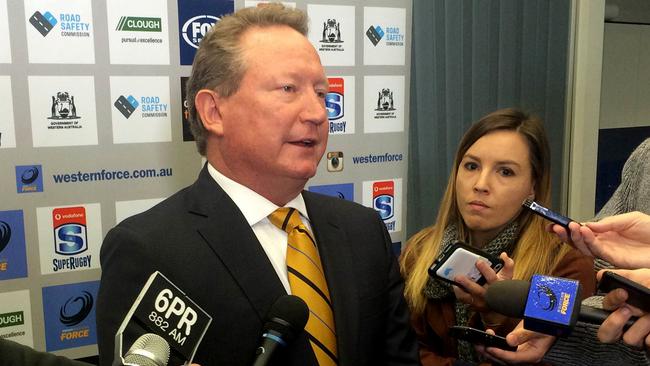
The competition, to be a souped up version of the National Rugby Championship, will launch in August next year and will involve teams from Asia as well as across Australia.
Forest, declaring a “historic day for rugby”, said the competition was being developed in collaboration with the Australian Rugby Union.
He said he was in negotiations with the ARU to ensure players who compete in his competition will also be eligible for Super Rugby and the Wallabies.
ARU Chairman Cameron Clyne said: “ARU is involved in collaborative discussions with Andrew Forrest and his Minderoo team and we look forward to continuing these discussions over the coming weeks.
Forrest’s actions come after his beloved Western Force were cut from Super Rugby.
Samantha Woodhill 11.55am: Housing, rate concerns hit consumer outlook
Consumer confidence rose 2.5 per cent in September compared to August hitting 97.9 points, but gains remain sluggish with sentiment down 3.4 per cent from September of last year.
Westpac chief economist Bill Evans put the pessimistic consumer outlook down to pressures on family finances; interest rate concern; deteriorating housing affordability and rising energy prices.
“Persistent weak consumer sentiment, consistent with weak consumer demand, may be worrying businesses around the sustainability of current strong conditions,” Mr Evans said.
House price expectations dipped 2.8 per cent but remained high, with 57 per cent of the consumers surveyed expect house prices to rise in the year ahead.
“From our perspective prospects for consumer spending and residential construction appear soft,” Mr Evans said.
He said that given the economic conditions, he doesn’t expect the RBA to raise interest rates in 2018.
Consumer outlook for the 12 months ahead remained negative but rose 2.7 per cent, putting it marginally above the long run average.
Mr Evans said the slightly improved sentiment likely reflects the mixed economic data: a 0.8 per cent GDP gain but weak household income and spending.
11.44am: Four rate hikes on the way: NAB
NAB expects the Reserve Bank to hike the cash rate four times in the next two years amid improved forecasts for the labour market, GDP growth and inflation.
“We are pencilling in rate rises of 25 bps in August and November of 2018 and a further two 25bp hikes in 2019, although the precise path will be data dependent,” the bank said in a note today.
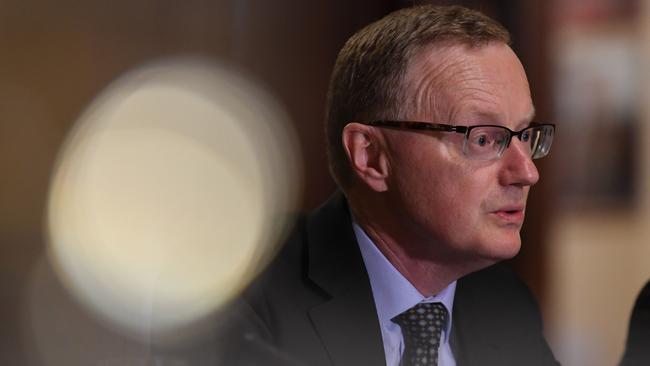
“A cash rate of 2.5 per cent by end-19 is still well below the RBA’s estimates of neutral (~3.5 per cent nominal), suggesting monetary policy will remain supportive of the economy.”
GDP data last week showed the local economy grow strongly in the second quarter, buoyed by rising business confidence and commodity prices.
GDP grew by 0.8 per cent in the quarter and was up 1.8 per cent from a year earlier.
“GDP growth will continue to build in late 2017, as LNG exports continue to surge and government spending remains strong. We still expect growth momentum to ease somewhat through 2018 and 2019 to around 2.5 per cent — which is in line with NAB’s estimates of potential growth — although domestic demand is a bit higher in 2019,” the bank said.
The forecast changes are largely due to a stronger labour market and slightly higher wages growth, with NAB expecting the unemployment rate to ease to 5.4 per cent by end-2017, 5.3 per cent by end-18 and 5.1 per cent by end-19.
“These trends should be enough to give the RBA greater confidence that inflation will return to (the lower portion of) the target band, although our growth forecasts remain weaker than the RBA’s and some facets of the outlook bear close watching,” NAB said.
Risks to the improved forecasts include the Australian dollar not depreciating as much as expected, a loss of momentum in the labour market, and evidence of household distress, NAB said.
Pia Akerman 11.15am: Wilson wins $4.5m in Bauer Media case
Actor Rebel Wilson has won more than $4.5 million in damages after fighting magazine giant Bauer Media in a landmark defamation case.
The Australian actor did not appear in the Victorian Supreme Court today as judge John Dixon announced his decision on the payout, saying she had suffered “substantial” damage to her reputation and career.
The 37-year-old had sought more than $7 million in damages after an all-female jury found she was maliciously defamed by four Bauer publications.
10.50am: Stocks tick higher at the open
Feel good sentiment in the US and European markets has trickled through to Australian stocks, with the major banks and the miners pushing the local bourse higher.
Locally, the benchmark S & P/ASX200 stock index was up 0.4 per cent after the first half-hour of trade as the major banks and miners led the charge. IG head of research Chris Weston said the banks were putting 16 points into the ASX200 and mining stocks were also performing well as commodity prices rose overnight.
“The financials globally in the US, in Europe and the UK are in a bit of a sweet spot and are basically being used as a vehicle to express a macro view that we are seeing rising rates,” he said.
“The ASX is a pretty simple beast; if you have got the financials and the materials sectors working well, the ASX is going to perform quite admirably.” Westpac led the banks, up 0.95 per cent at $31.95, while Commonwealth Bank of Australia improved 0.86 per cent to $76.57, National Australia Bank climbed 0.85 per cent to $31.02 and ANZ rose 0.8 per cent to $30.14.
The rising price of iron ore helped boost the miners, with Rio Tinto lifting 1.53 per cent at $69.85, BHP Billiton up 1.47 per cent at $27.52, and Fortescue 0.76 per cent stronger at $5.95.
Gold miner Newcrest was 0.77 per cent higher at $22.38 following its announcement that ore extraction has resumed at the second part of the company’s NSW Cadia East mine after ground support plans were accepted by the regulator. Oil prices lifted after OPEC forecast higher demand next year and Russia and Venezuela confirmed their commitment to a production-cutting deal to reduce the global crude glut.
Local energy companies were mixed, with Origin Energy was up 1.29 per cent at $7.87, Woodside Petroleum down 0.1 per cent at $28.57 and Oil Search steady at $6.79.
Retirement homeowner and operator Aveo Group was steady at $2.54 after news it is facing a second class action amid concerns of its alleged use of “unfair and unconscionable” contracts against elderly Australians.
The Australian dollar is slightly higher against the greenback, which had rallied on a rise in US Treasury yields.
AAP
Samantha Woodhill 10.32am: No irrational exuberance in markets: BAML
Bank of America Merrill Lynch sees “no irrational exuberance yet” in global equity markets as cash levels remain high and there has been a large jump in strategies to guard against a fall.
In its monthly survey of fund managers, BAML found the average cash level of funds invested fell to 4.8 per cent but remained above the 10-year average of 4.5 per cent.
“Cash levels remain elevated,” said Michael Hartnett, chief investment strategist.
“Investors have shunned mean reversion and cut their expectations for much higher bond yields.”
The report said that global appetite for risk “has room to grow”, after only 25 per cent of investors said they expect faster economic growth over the next 12 months, down from 65 per cent at the beginning of the year.
Investors pointed to threats from North Korea and Chinese credit tightening among the biggest risks to markets.
Eli Greenblat 10.14am: Miners deliver in dividend payout bonanza
Despite the cries of indignation from Telstra shareholders who were told future dividend payments would be sliced, investors actually did very well this reporting season on the dividend front with two-thirds of the market’s biggest companies lifting payouts and the average company raising dividends by a healthy 18 per cent.
Analysis of the just-completed reporting season by Don Hamson at Plato Investment Management showed that it was resource stocks that saved the day, filling the top spots for the biggest increases in dividends.
Miner South 32 “took the cake’’ according to Hamson, lifting cash dividends over 500 per cent and gross dividends rose even further, up 777 per cent. Others to star in terms of rich dividend payments included Oil Search (+230 per cent), BHP (+193 per cent), Rio (+133 per cent) and Fortescue Metals (+108 per cent). All increased dividends strongly on the back of a full year of higher commodity prices and a continued focus on reducing costs.
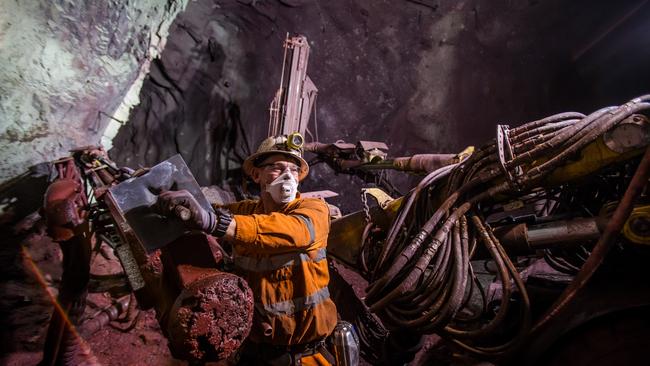
There were also some good lifts outside the resources sector, with IAG lifting dividends 54 per cent, Woolworths +52 per cent, AGL +39 per cent, Wesfarmers +26 per cent and JB Hi -Fi +26 per cent.
Telstra grabbed the headlines with the announcement that next year it will slash its full-year dividend to 22c a share fully franked — a 29 per cent reduction — and expects to maintain dividends at that level going forward.
“We believe the market has now pretty much priced all the bad news into Telstra, with the stock now trading on a forward dividend yield of approximately 6 per cent or 8.6 per cent on a gross basis using Telstra’s closing August share price of $3.67,” Mr Hamson said.
Plato tracked 129 stocks within the S & P/ASX 200 making up 63 per cent of that index by value, and found two thirds of stocks increased dividends, while 20 per cent reduced dividends.
The average company increased dividends by 18 per cent, although the median change was a much smaller 5 per cent increase.
10.05am: Newcrest reopens Cadia gold mine
Newcrest Mining has started ore extraction from the second part of its Cadia East mine in NSW, where operations had remained suspended after an earthquake in April.
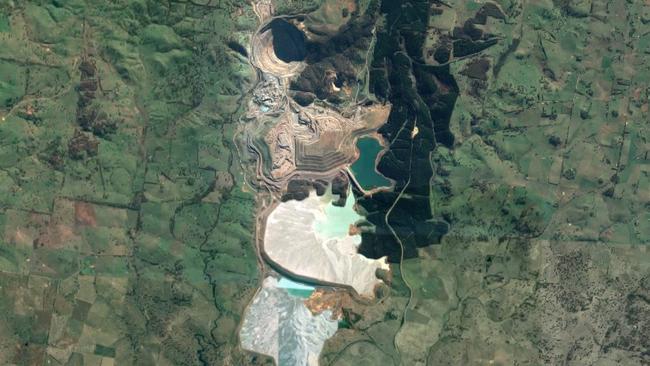
The company said the regulator has accepted its final ground support plans for the mine’s Panel Cave 1 and the prohibition notice will be lifted to allow operations to restart as areas are upgraded according to the submitted plans. Production at the mine’s Panel Cave 2, which resumed in July, continues to be ramped up, Newcrest said.
AAP
9.50am: Aveo to face second class action
Retirement homeowner and operator Aveo Group is due to face a second class action amid concerns of its alleged use of “unfair and unconscionable” contracts against elderly Australians.
Legal firm Maurice Blackburn on Wednesday said it is investigating running a no- win no-fee class action for former residents, calling for stronger rights and protections for older Australians and their families who are allegedly being taken advantage of by the aged care company.
The announcement comes in the wake of a Victorian government inquiry into problems in the retirement housing sector, a watchdog investigation, and an initial investigation into a class action by Levitt Robinson Solicitors in June. Maurice Blackburn class action principal Brooke Dellavedova said a class no-win no-fee class action, which means clients will not be out of pocket if the case is unsuccessful, could be the best option for those affected by unnecessarily complicated and unfair contracts.
“We don’t think it’s fair or legal to subject elderly people to complex and confusing contracts that contain unfair terms,” Ms Dellavedova said. “If enough people want to take action against Aveo, then we will look to step in and stand up for these people.” Consumer Action Law Centre chief executive Gerard Brody welcomed the opportunity for a class action regime saying residents and their families have previously struggled to access justice due to court and tribunal expenses. “Older people should be able to move into retirement housing without having to worry about being bamboozled by complex contracts and unfair fees,” Mr Brody said.
“Until now, the retirement village sector has avoided proper scrutiny of its contracts, and it’s about time someone stood up for the rights of residents.”
AAP
Robert Gottliebsen 9.20am: Setting the rules for an AGL power play
Be careful Malcolm Turnbull. Be careful Josh Frydenberg. When AGL comes back to you in 90 days with a proposal which it should have prepared before it started its “no coal” advertisements make sure it is not just another politically-motivated whitewash.

Such plans tend to come from companies that have agendas other than producing the best results for customers and shareholders.
So let’s set rules by which the AGL 90-day plan to close the Liddell plant in five years and offer iron-clad energy security and lower prices will be will be judged.
There are three criteria — energy security, price (including capital cost sums) and carbon advantage. Let us start with what will be required on an energy security basis because that’s what state governments headed by Mike Baird and Gladys Berejiklian in NSW, Daniel Andrews in Victoria and Jay Weatherill in South Australia did not do and therefore it requires federal intervention.
Click here to read more of Robert Gottliebsen’s commentary on AGL.
Darren Davidson 8.45am: Ten Network admins ‘acted illegally’
Ten Network administrators KordaMentha acted unlawfully when deciding to ask creditors in the broadcaster to accept or reject a takeover offer by US media giant CBS, a court has heard.
Lawyers for a rival bid from Ten backer Bruce Gordon yesterday argued that KordaMentha was not legally authorised or empowered to express an opinion as to the merits of one deal over another.
“The administrators turned the law on its head by choosing the winner and excluding Birketu and Illyria in its report,” Andrew Bell, SC, representing Mr Gordon, told Justice Ashley Black.
8.35am: Apple shares slide on iPhone X
Shares in Apple fell by 0.4 per cent in overnight trade following details of the new iPhone X launch date. The slide comes after the stock gained 1.8 per cent on Monday.
Technology reporter Chris Griffith is at the Apple launch event in Cupertino. Read his update on the new iPhone models here.

Nick Tabakoff 8.20am: Banks’ ‘Mickey Mouse’ insurance slammed
The Australian Federation of Travel Agents has slammed banks and financial institutions over free travel insurance policies that offer no terrorism cover, accusing them of issuing “Mickey Mouse” policies that expose their best credit-card customers to huge financial risk.
The tough words from AFTA boss Jayson Westbury came as four more financial institutions — international financial giants American Express and HSBC, as well as the Bendigo and Heritage banks — caved in to pressure in the wake of this week’s investigation by The Australian, and started reviews of the terror cover for their free insurance schemes.
7.53am: Oil lifts as OPEC output falls
Crude futures turned higher after OPEC said its oil output fell in August and as U.S. refiners continued to ramp up following Hurricane Harvey.
U.S. crude futures rose US16 cents, or 0.33 per cent, to $US48.23 a barrel on the New York Mercantile Exchange. Brent, the global benchmark, rose US43 cents, or 0.8 per cent, to $US54.27 a barrel.
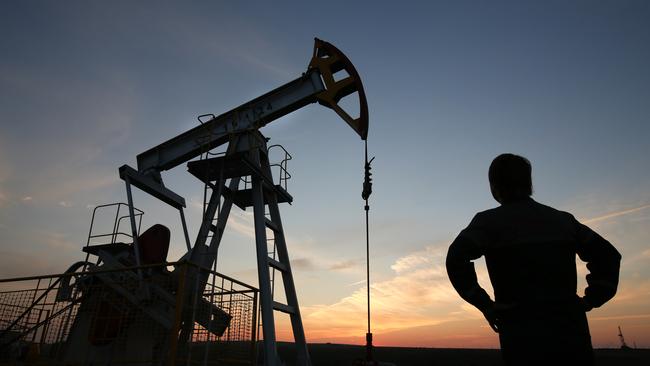
In its monthly oil report, the Organization of the Exporting Countries said its production fell for the first time since April in a sign that its efforts to rein in the global supply glut are starting to pay off. OPEC said Tuesday that its output edged lower by 0.24 per cent to 32.76 million barrels a day in August. It also said demand will be higher than it previously thought.
Dow Jones
7.05am: Stocks tipped to lift at open
The Australian market looks set to open higher, following solid gains on Wall Street overnight.
At 7am (AEST), the share price futures index was up 25 points, or 0.44 per cent, at 5,770.
In the US, the Dow Jones index was up 61.49 points or 0.28 per cent to 22,118.86, with financial stocks leading the charge.
Locally, in economic news on Wednesday, the Westpac Consumer Confidence Index is due to be released.
Meanwhile, APRA’s head of governance, culture and remuneration, Fahmi Hosain, and ASIC senior executive leader for market supervision, Greg Yanco, are slated to speak at an Actuaries Institute Seminar in Sydney.
No major equities news is expected.
The Australian market on Tuesday closed higher for a second consecutive session due to strong gains by the banks and miners.
On Tuesday, the benchmark S & P/ASX200 was up 33.3 points, or 0.58 per cent, at 5,746.4 points, while the broader All Ordinaries index was up 31.3 points, or 0.54 per cent, at 5,806.4 points.
AAP
6.55am: Dollar dips against greenback
The Australian dollar is slightly lower as the US dollar rallies driven by a rise in US Treasury yields.
At 7.39am (AEST) the Australian dollar was worth US80.19 cents, from US80.37c on Tuesday.
BK Asset Management managing director Kathy Lien said although the US dollar gained against th Australian dollar, it underperformed versus some other currencies.
“The inconsistency in the dollar’s performance is actually a positive sign because it reflects the improvement in risk appetite,” she said.
AAP
6.40am: Wall St climbs to fresh record highs
Wall Street stocks jumped to fresh records Tuesday, boosted by financial shares that led a rally on easing fears over North Korea and US hurricanes.
All three major indices finished at new all-time highs, with the Dow Jones Industrial Average gaining 0.3 per cent to 22,118.86, less than a point above the prior peak.
The S & P 500 advanced 0.4 per cent to 2,496.48, its second straight record, while the Nasdaq Composite Index rose 0.3 per cent to 6,454.28.
The gains came on the heels of a solid rally Monday after Hurricane Irma caused less damage in Florida than feared, and as anxiety about North Korea’s nuclear program diminished. Those dynamics were still in play Tuesday, analysts said.
Banks were big beneficiaries of the improved sentiment, with JPMorgan Chase advancing 1.3 per cent and Goldman Sachs 2.2 per cent despite statements from bank executives reporting weakness in the trading business.
DowDuPont advanced 2.6 per cent after confirming it was on target to save $4 billion following the completion of its merger. The chemicals giant also tweaked its plan to restructure into three companies to try to placate some shareholder activists who had criticised the original plan.
Among other Dow companies, Pfizer rose 3.1 per cent and McDonald’s lost 3.2 per cent.
AFP
6.25am: European markets mostly climb
World stock markets mostly rose Tuesday as concerns over North Korea and Hurricane Irma faded, but London dipped as strong inflation data sent the pound to a one-year dollar peak.
Frankfurt and Paris equities also pushed higher as the North Korea crisis eased and dealers breathed a sigh of relief that Hurricane Irma caused less damage to Florida than initially feared.
London’s benchmark FTSE 100 index was hobbled as official data showed Britain’s 12-month inflation rate jumped to 2.9 per cent in August compared to 2.6 per cent in July.
In reaction, sterling jumped on hopes the Bank of England could lift its key interest rate sooner than expected, although it is not forecast to make any change at its policy meeting on Thursday.
— No news, good news —
The strong pound weighs on multinational companies that earn income abroad, and therefore tends to send their share prices sliding.
“Once again we find ourselves in a scenario in which no news is good news and while underlying risks remain, the longer we go without another nuclear or missile test, the more positive investors will become,” said Oanda analyst Craig Erlam.
“The only problem with this is that, with the UN having just agreed on new sanctions against North Korea — spearheaded by the US — I wonder how long we will have to wait for an act of provocation in response.” Spreadex analyst Connor Campbell said that “sterling’s FTSE-damaging rise prevented the UK index from indulging in the same North Korea and Hurricane Irma-related relief that lifted the US markets last night and is continuing to work its magic on the eurozone bourses.” Eurozone indices were also partly buoyed by the weaker euro versus the pound. “The effect has been to push the FTSE 100 into negative territory with London’s main index stumbling, while across the channel eurozone stocks continue to find buyers,” added Chris Beauchamp, chief market analyst at IG.
London’s FTSE 100 closed down 0.2 per cent at 7,400.69, Germany’s DAX finished the session up 0.4 per cent at 12,524.77, while the CAC 40 in Paris rose 0.6 per cent to close at 5,209.01.
AFP


